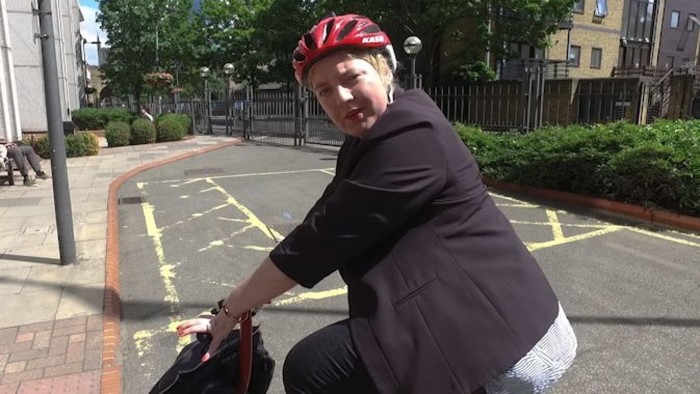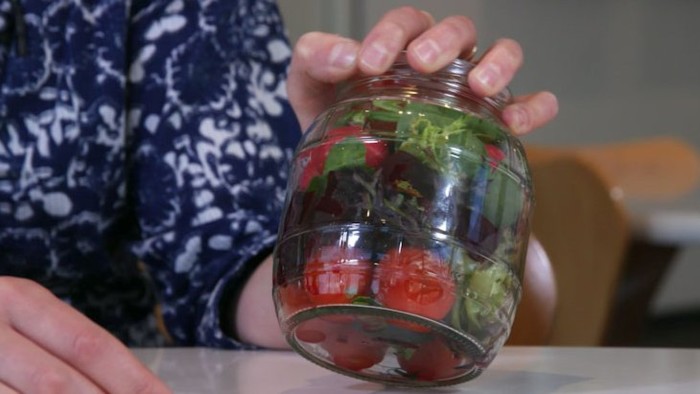How to save money: tips for millennials
Simply sign up to the Retail & Consumer industry myFT Digest -- delivered directly to your inbox.

Millennials do not have very much money, yet are constantly told that they need to save more. A generation faced with the prospect of being worse off than their parents, young people are weighed down by student debt and the high cost of renting — never mind saving for a deposit to buy a home.
Making your money last until the end of the month while building up some savings on the side is certainly a challenge — although not confined to those born after 1980. Could those in their 40s be any better at saving money than people in their 20s?
To find out, Kate Beioley, the FT’s 29-year-old Millennial Money columnist, and Claer Barrett, the FT’s 41-year old personal finance editor challenged each other to a “Thrift Off”, gathering tips from colleagues and FT readers to find the best ways of making their money go further in London, one of the most expensive cities in the world.
“I am the typical millennial, with many reasons to save — but I don’t want to sacrifice my social life,” says Kate. “A lot of the tips are common sense, but making smart choices with your money requires both inspiration and organisation.”
“No matter how much or how little you earn, there are still benefits to a thrifty mindset,” says Claer, who has kept up many of the money-saving methods she divined as a student in London throughout her professional working life.
“If you can stick to a budget and generate a surplus — no matter how small — hone your thrift muscles by hiving it off into a savings account. When you first start working, thrift may be about financial survival, but as your income increases, that ‘spare money’ can be worked even harder inside a pension or stocks and shares Isa.”
This may sound frightfully dull compared to a spontaneous budget-busting big night out. While being able to manage money well has always carried the stigma of being a boring exercise in self-denial, being thrifty doesn’t mean you can’t have fun.
In fact, it is more about being mindful of your money choices, using money saving tips and apps creatively to stretch your budget a bit further. Save money in one area, and you have the flexibility to spend in another. And many tips have the added benefit of being greener. Regardless of your age, how many of these tips could you apply to your own life?
Thrift at work
After rent, the cost of commuting is one of the biggest strains on any worker’s budget. Many companies offer workers an interest-free season ticket loan, or the option to work flexibly to avoid expensive peak time travel.
Pairing your Oyster card with the 16-25 Railcard gives you a one-third discount on off-peak travel on London’s Tube, overground and DLR network (after 10am during the week and all day at the weekends).
“You can only do this in person at Tube, London overground and TfL stations, some National Rail ticket offices, Oyster Ticket Stops, and at official visitor centres,” say FT readers Gareth Owen and Ashley Agwuncha, who both win a pair of tickets to the FT Weekend Festival for their ingenuity. Those who managed to snap up the 26-30 Railcard — trialled to 10,000 people this year — can also link their cards, although it is unclear when the trial will be extended.
A one-year 16-25 Railcard costs £30, but National Union of Students members can receive 12 per cent off. Sign up for a student bank account with Santander and you receive a four-year railcard for free.

The Cycle to Work Scheme offers a tax-efficient route of travelling to the office — even if only part of your commute is on two wheels. If your company has signed up to the scheme, you can buy a bike and related safety equipment worth up to £1,000 via salary sacrifice, which could unlock savings of up to £400 for higher rate taxpayers. The remaining cost is spread over a year in monthly, interest-free payments.
Claer says: “Not having to use public transport means that cycling to work saves me £1,300 a year, as well as keeping me fit.”
Kate opted to walk to work for a week, which added 20 minutes to her usual 30- minute train and Tube commute, but saved her nearly £35 in transport costs. “I had to get up earlier, but it was worth it to avoid the usual Tube rage,” she says.
Buying lunch out is an expensive habit. Claer always brings in her own lunch, and reckons that abstaining from a daily Pret binge saves her about £30 a week. “Prepare your lunch the night before, as there’s never enough time in the morning,” she advises. “To keep it cheap and minimise prep time, just make a bigger dinner and take in the leftovers — plus invest in a lunchbox that doesn’t leak.”
Kate favours tech hacks to buy ready-made lunches for less. Her top pick is the Too Good to Go app, designed to reduce food waste by selling fresh but unsold food at outlets near you costing between £2.50 to £5. Some 5,000 vendors have signed up, selling food ranging from taco boxes, sandwiches, cakes, salads and more.
“You do have to plan ahead and potentially take a later lunch break as customers have to pick up food within certain periods and often after 3pm,” Kate says. “But logging on early ensures the best chance of a bargain lunch break, and I’ve also taken boxes home for a cheap dinner.”
The Happiour app offers exclusive deals on high street and independent eateries across the UK. Users search for a nearby deal and show a code at their chosen destination. Offers change regularly, so planning your lunch around it might not always work, but save your favourite offers and you’ll be notified when they go live again.

An alternative homemade option is the jam jar lunchbox, layering salad items in an old pickle jar, favoured by FT reporter Chloe Cornish. It won’t leak, it’s plastic free — and Instagram-worthy.
Coffee is another daily expense that can be trimmed — but you don’t have to give it up. Bringing your own reusable cup will help save the planet, and save you money. Pret A Manger and Patisserie Valerie offer a generous 50p discount, most other chains offer 20p-25p off.
Kate investigated “coffee arbitrage”. The cost of an espresso is usually much cheaper than a black Americano — yet all that is added is hot water. “I get an espresso in the work canteen, and add my own hot water in the kitchen downstairs,” she says. “This saves me 70p per drink.”
Finally, enjoy more “water cooler moments” outside the office with the Refill app, which lists cafés and restaurants prepared to top up reusable water bottles for free, saving money and single-use plastic.
Thrifty nights out
Millennials can still have a social life on a budget, dispelling the perception that saving money means staying in every night and eating baked beans.
Comedy clubs are one of the best bets for a cheap night out. Many up-and-coming comics take part in low-cost shows to test out new material or warm-up for major festivals. Kate went along to north London’s Angel Comedy Club which regularly hosts pay-what-you-like gigs.
“The setting was very intimate, so a slight worry as far as heckling was concerned, but I loved two of the four acts and donated a fiver,” she says.

In south London, The Tommyfield in Kennington puts on an £8 show every Thursday, often including mystery, high-profile names. Recent acts have included Sarah Pascoe, a star of Live at the Apollo and an Edinburgh Fringe award winner.
You can apply online for free tickets to TV and radio shows filmed in front of a live audience such as BBC’s Have I Got News for You and Later . . . With Jools Holland — a suggestion from FT reader Ginder Sohal that Claer attests is a bargain.
Preloading supermarket-bought booze at home before a night out is one way of cutting down a bar bill, but there are some app-based alternatives. FT reader Alexander Blums is a fan of the app Drinki which offers one free drink per night (typically a cocktail or a pint) in a variety of London bars that you may not otherwise have discovered — generally early in the evening. “I suspect the idea is that people will stay for more drinks and end up spending more money,” he says.
Cocktail chain Be At One has an app offering free drinks and discounts including “Appi Hour” which doubles the length of its usual happy hour for those who download.
Feedback app Tipps also offers discounts on a range of bars and restaurants. Users collect TippCoins when they leave a review, and can spend them in partner restaurants and bars.
CityMunch offers discounts during quieter periods at more than 200 restaurants in London, Bristol, Manchester and Bath. Diners log in and reserve discount vouchers if they eat during periods when demand for a table is lower — a surge pricing model in reverse.
Kate went out for tapas in Shoreditch and got 40 per cent off the final bill, a saving of more than £20. Be aware that some restaurants limit discounts to certain dishes.
Finally, follow the Instagram account @softlaunchlondon to get up to 50 per cent off or a free sample at new restaurants, and those revamping their menu.

Thrifty nights in
Setting up your own supper club at home is the ultimate way to eat well for less. East Londoners Violaine Verry and Robbie de Santos have been running The Clapton Pot for five years as a way of meeting new people in their local area. Many supper clubs are the preserve of chefs and those aspiring to open a restaurant, and tickets may not be cheap. But the Clapton Pot offers six lucky people free tickets for its monthly kitchen suppers in Hackney, east London, via online ticketing site Eventbrite — although guests are asked to bring a bottle of wine.
“A three-course meal and a couple of drinks in a London restaurant can cost at least £30 for one person, but for that, you can feed eight people generously,” Violaine says. “We really enjoy planning the menus, and shop for fresh, seasonal ingredients at the nearby Ridley Road Market in Dalston, which is really good value — although we have been known to haggle for figs.”
“It’s a really fun way of meeting new people and making new friends,” says Robbie, who met Violaine at the first-ever dinner in 2013. “Outside work, it’s sometimes hard to meet new people with different perspectives. This is a nice way of breaking down those barriers.”
Violaine has a beautiful kitchen but stresses this is not a prerequisite. “Anyone of any age could do this at home with a group of friends. As a student in Paris, I didn’t have a dining table, but we had cheap beer and cheap pasta, and we ate off our laps. It’s all about getting people together.”
Claer enjoyed trying this out for herself, opting for Middle Eastern-inspired recipes and plenty of vegetarian dishes to stick to a £30 budget making three courses for eight people. “It’s a fun way of having a very informal dinner party,” she says. “I did all of the shopping and cooking, but friends and family brought lots of wine. Now I just need to persuade them to return the favour!”
Thrifty culture
London has an array of free museums and art galleries, with many offering late opening nights, when the crowds of schoolchildren abate. On the “First Thursday” of the month, more than 150 galleries in east London run free events, exhibitions, talks and private views at special late openings. Art fans can make the most of the experience with a free walking tour or Art Bus between venues, including the Whitechapel Gallery and the Barbican Centre.
Film fan and FT reader Julia Blest signed up for the “Meerkat Movies” deal after buying an insurance policy via Comparethemarket.com that entitled her to two-for-one tickets at Odeon cinemas on Tuesdays and Wednesdays for one year. “Search for the cheapest travel insurance policy and you can often find something for a pound or two,” she says. “Obviously, you should bring your own snacks!”
Reader Rita Dattani says she has signed up to ShowFilmFirst for cheap cinema, theatre and concert tickets. “You just have to pay a small admin fee of £2 to £3 to secure your place,” she says.
FT reader George Huntley has signed up to schemes offered by top London theatres enabling young people to watch plays for a fraction of the normal ticket price. “Since moving to London five years ago, I’ve been able to pick up tickets worth £100 for as little as a fiver,” he says.
The National Theatre runs Entry Pass, a free membership scheme for anyone aged 16-25, which offers £7.50 tickets to all productions and £10 Mates Rates tickets for friends of members.
Young Barbican members (14- to 25-year-olds) have access to to £5, £10 or £15 tickets for art, film, music, theatre and dance shows and new film releases at a cost of £5 (from Monday to Thursday).
Theatre fans can also download the TodayTix app, which sells advance tickets to London shows. Users can receive alerts to apply for heavily discounted “rush tickets” every day, sold on a first-come first-served basis, and there are daily lotteries to win tickets for popular West End shows.
In London’s Leicester Square, ticket booth TKTS sells returned tickets for West End shows today, tomorrow and the next day for a discount.
London’s churches are a rich, yet often overlooked, source of free musical events, including lunchtime and evening concerts. Choral and classical music dominate. The Royal Opera House puts on free recitals (though you’ll need to reserve a ticket online) as does the Royal Academy of Music.
Music fans who share a house can use Spotify’s “Premium for Family” plan to share a discounted subscription to the streaming service. For £15 per month, up to five people at the same address can sign up.
Thrifty habits
Discounts on shopping can be a false economy, as you have to spend money in order to make a saving. However, Claer reckons she saved hundreds of pounds a year by using this tip. “Whenever you shop online, before you pay, open another window and put the name of the retailer and ‘promo code’ into a search engine. This takes seconds — and nine times out of 10 you will unlock a discount code or free delivery.”
Most UK banks link with retailers to offer cashback schemes to customers — typically for online purchases — which can be as much as 10-15 per cent.
It’s possible to get a wide range of second-hand items cheaply online — or even for free. FT readers recommend Freecycle, Streetbank and local “sell or swap” websites on social media for furniture, tech, and children’s toys and clothes.
Charity shops are a magnet for thrifty millennials. FT reader Rosie Saffell says: “My girlfriends and I used to get together and just make a day of browsing through charity shops in rich areas like St John’s Wood and Fulham.”
Claer can never walk past a charity shop without checking out the second-hand books. “Me and my dad are both huge fans of detective fiction. We buy books, swap them, and then donate them back to the charity shop to be sold again.”
When supermarket shopping, popping in just before closing time often yields discounted “yellow sticker” bargains, including meat or fish that can be frozen. This is also a good tactic for sushi fans. If they’re working late, both Claer and Kate have been known to pop into Wasabi, Itsu or Abokado on the way home to grab half-price items half an hour before the shop closes.
The Millennial Moment
Articles in this series examine millennials’ dramatic impact on the world’s economy.
Part one
Introduction, and millennials in charts
Part two
Disruption: The ‘millennial’ World Cup
Part three
Authenticity: The new consumers
Part four
Community: Millennial cities
Part five
Thrift: Saving not wasting
Part six
Experiences: The ‘feeling’ economy
Part seven
Immediacy: Instant money
Part eight
The future of millennial living
Explore the series here.
To burn off that chicken katsu curry, running is a great low-cost exercise. FT reader William Mackintosh recommends Parkrun, a free 5km run organised by volunteers which takes place in parks around the world every Saturday morning. “Parkrun is highly inclusive, there is a wide range of fitness levels and ages,” he says. “People run with their dog, and a parent can push a buggy. I have greatly improved my fitness, starting with the free NHS Couch to 5k plan, and can now run a half marathon.” Register online at parkrun.org.uk.
Reader Rosie Saffell recommends free yoga classes put on by sportswear retailers Lululemon and Sweaty Betty inside their shops.
Claer is a fan of the Treatwell app, which makes it easy to find nearby salons offering discounts for off-peak hair, nails and waxing appointments. “By taking a later lunch break, I saved 20 per cent off the price of a leg wax,” she says.
If you intend to spend your savings on a holiday abroad, be aware that most UK credit and debit cards will incur a surcharge of about 3 per cent when used overseas. Challenger banks Monzo, Starling and Revolut all have fee-free cards, or apply for a Halifax Clarity credit card before you jet off.
Following the Thrift Off, Claer conceded victory to her millennial challenger Kate. “Most of the things I do to save money are things I’ve been doing for years, but Kate was ingenious and found loads of new digital ways to save,” she says. “Many of the savings are small, but establishing thrifty habits when you are young will pay dividends when you are older.”
Are you interested in news and analysis about the markets? Sign up to the FT Markets WhatsApp group. Whether you are a subscriber or not, the stories will always be free (outside of the FT’s subscription paywall).
Get your spending in check
The best way of saving money? Spend less of it. Alongside our money-saving tips, run these simple rules over your finances:
Study your statements
Go through your direct debits. Are you paying for subscriptions or services you no longer use? Cancel them. Could you save money on bills by switching suppliers?
Set a budget
Consider transferring your day-to-day spending to a separate mobile-based account so it’s easier to monitor and review. Your statements will reveal the areas where you’re most likely to splurge. App-based banks like Monzo, Starling and Atom have digital tools that allow you to set limits.
Save regularly
Motivate yourself by setting a goal, such as £500 for a holiday or £50 a month into a savings plan. It’s possible to get up to 5 per cent interest on some UK current accounts. If you’re saving for a housing deposit, investigate the Lifetime Isa.
Whatever your age, and wherever you are in the world, share your own money saving tips in the comment field below. The FT will publish a selection of the best ones.

Comments